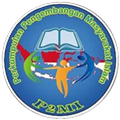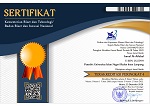THE INFLUENCE OF MOTIVATION AND WORK DISCIPLINE IN THE FRAMEWORK OF ISLAMIC ECONOMIC EMPOWERMENT ON THE PERFORMANCE OF COMPANY EMPLOYEES
Abstract
In the era of globalization and increasingly fierce competition, companies are required to improve the performance of their employees to survive and thrive. PT. Pegadaian (Persero), one of the largest financial companies in Indonesia, faces similar challenges in its efforts to maintain a strategic position in the market. One strategy that can be used to improve employee performance is through increased motivation and work discipline. This study aims to analyze the effect of Work Motivation, Work Discipline, and Employee Performance at PT. Pegadaian (Persero) Kedaton Branch Bandar Lampung, a saturated sample was used to select 40 employees of PT. Pegadaian Kedaton branch. The analysis method uses multiple linear regression models, the coefficient of determination then hypothesis testing using the t-test and F test. The results showed that the t-test (partial) stated that work motivation had a positive and significant effect on the performance of PT. Pegadaian Kedaton employees, work discipline did not affect work productivity. While the F test has simultaneous results that work motivation and work discipline, significantly affect employee work productivity. The coefficient of determination analysis explains that motivation, discipline, and performance affect work productivity. this research not only has a direct impact on improving the performance of PT. Pegadaian (Persero) employees also make a significant contribution to the overall development of Islamic society. The application of the results of this study can be a catalyst for positive change in the business world and society, making Islamic values a strong foundation for sustainable and meaningful economic development.
Keywords
Full Text:
PDFReferences
Abbas, Jawad. “Impact of Total Quality Management on Corporate Sustainability through the Mediating Effect of Knowledge Management.” Journal of Cleaner Production 244 (January 2020): 118806. https://doi.org/10.1016/j.jclepro.2019.118806.
Arifin, Muhamad. “The Influence Of Islamic Law And Economic Principles On Banking Industry In Indonesia.” Pt. 2 J. Legal Ethical & Regul. Isses 24 (2021): 1.
Asutay, Mehmet, and Isa Yilmaz. “Constituting an Islamic Social Welfare Function: An Exploration through Islamic Moral Economy.” International Journal of Islamic and Middle Eastern Finance and Management 14, no. 3 (2021): 524–40.
Atatsi, Eli Ayawo, Jol Stoffers, and Ad Kil. “Factors Affecting Employee Performance: A Systematic Literature Review.” Journal of Advances in Management Research 16, no. 3 (2019): 329–51.
Aydin, Necati. “Paradigmatic Foundation and Moral Axioms of Ihsan Ethics in Islamic Economics and Business.” Journal of Islamic Accounting and Business Research 11, no. 2 (January 2, 2020): 288–308. https://doi.org/10.1108/JIABR-12-2016-0146.
Bashir, Aideed, Abeera Amir, Mehwish Jawaad, and Tania Hasan. “Work Conditions and Job Performance: An Indirect Conditional Effect of Motivation.” Cogent Business & Management 7, no. 1 (2020): 1801961.
Bayona, Jaime Andrés, Amparo Caballer, and José María Peiró. “The Relationship between Knowledge Characteristics’ Fit and Job Satisfaction and Job Performance: The Mediating Role of Work Engagement.” Sustainability 12, no. 6 (2020): 2336.
Bin-Nashwan, Saeed Awadh, Hijattulah Abdul-Jabbar, Saliza Abdul Aziz, and Alhassan Haladu. “Zakah Compliance Behavior among Entrepreneurs: Economic Factors Approach.” International Journal of Ethics and Systems 36, no. 2 (2020): 285–302.
Chang, Kuo-Chien, Ya-Ti Hsu, Yi-Sung Cheng, and Nien-Te Kuo. “How Work Engagement Influences Relationship Quality: The Roles of Work Motivation and Perceived Service Guarantee Strength.” Total Quality Management & Business Excellence 32, no. 11–12 (2021): 1316–40.
Devie, Devie, Lovina Pristya Liman, Josua Tarigan, and Ferry Jie. “Corporate Social Responsibility, Financial Performance and Risk in Indonesian Natural Resources Industry.” Social Responsibility Journal 16, no. 1 (2020): 73–90.
Dinc, Yusuf, Mehmet Çetin, Mehmet Bulut, and Rashed Jahangir. “Islamic Financial Literacy Scale: An Amendment in the Sphere of Contemporary Financial Literacy.” ISRA International Journal of Islamic Finance 13, no. 2 (2021): 251–63.
Durugbo, Christopher M. “After-Sales Services and Aftermarket Support: A Systematic Review, Theory and Future Research Directions.” International Journal of Production Research 58, no. 6 (2020): 1857–92.
Forson, Joseph Ato, Eric Ofosu-Dwamena, Rosemary Afrakomah Opoku, and Samuel Evergreen Adjavon. “Employee Motivation and Job Performance: A Study of Basic School Teachers in Ghana.” Future Business Journal 7, no. 1 (2021): 30.
Furqani, Hafas, Gunawan Adnan, and Ratna Mulyany. “Ethics in Islamic Economics: Microfoundations for an Ethical Endogeneity.” International Journal of Ethics and Systems 36, no. 3 (2020): 449–63.
Furqani, Hafas, and Mohamed Aslam Haneef. “Configuring Problems of Economics in Islamic Perspective: Moral Nexus, Realities and Its Unification.” International Journal of Ethics and Systems 39, no. 4 (2023): 875–91.
Iqbal, Qaisar, Noor Hazlina Ahmad, and Basheer Ahmad. “Enhancing Sustainable Performance through Job Characteristics via Workplace Spirituality: A Study on SMEs.” Journal of Science and Technology Policy Management 12, no. 3 (2021): 463–90.
Iskamto, Dedi, Aripen Yapentra, Putra Budi Ansori, and Mohamad Jupri. “Effect of Working Discipline Toward Performance: An Empirical Investigation.” KnE Social Sciences, 2020, 492–501.
Jan, Ahmad Ali, Fong-Woon Lai, and Muhammad Tahir. “Developing an Islamic Corporate Governance Framework to Examine Sustainability Performance in Islamic Banks and Financial Institutions.” Journal of Cleaner Production 315 (2021): 128099.
Kaasinen, Eija, Franziska Schmalfuß, Cemalettin Özturk, Susanna Aromaa, Menouer Boubekeur, Juhani Heilala, Päivi Heikkilä, et al. “Empowering and Engaging Industrial Workers with Operator 4.0 Solutions.” Computers & Industrial Engineering 139 (January 2020): 105678. https://doi.org/10.1016/j.cie.2019.01.052.
Kader, Haithem. “Human Well-Being, Morality and the Economy: An Islamic Perspective.” Islamic Economic Studies 28, no. 2 (2021): 102–23.
Kalkavan, Hakan, Hasan Dinçer, and Serhat Yüksel. “Analysis of Islamic Moral Principles for Sustainable Economic Development in Developing Society.” International Journal of Islamic and Middle Eastern Finance and Management 14, no. 5 (2021): 982–99.
Karatepe, Osman M, Hamed Rezapouraghdam, and Raheleh Hassannia. “Job Insecurity, Work Engagement and Their Effects on Hotel Employees’ Non-Green and Nonattendance Behaviors.” International Journal of Hospitality Management 87 (2020): 102472.
King, Rachel, Bethany Taylor, Ashfaque Talpur, Carolyn Jackson, Kim Manley, Nichola Ashby, Angela Tod, Tony Ryan, Emily Wood, and Michaela Senek. “Factors That Optimise the Impact of Continuing Professional Development in Nursing: A Rapid Evidence Review.” Nurse Education Today 98 (2021): 104652.
Kipper, Liane Mahlmann, Sandra Iepsen, Ana Julia Dal Forno, Rejane Frozza, Leonardo Furstenau, Jéssica Agnes, and Danielli Cossul. “Scientific Mapping to Identify Competencies Required by Industry 4.0.” Technology in Society 64 (February 2021): 101454. https://doi.org/10.1016/j.techsoc.2020.101454.
Li, Wenjing, Tahseen Ahmed Bhutto, Wang Xuhui, Qamaruddin Maitlo, Abaid Ullah Zafar, and Niaz Ahmed Bhutto. “Unlocking Employees’ Green Creativity: The Effects of Green Transformational Leadership, Green Intrinsic, and Extrinsic Motivation.” Journal of Cleaner Production 255 (2020): 120229.
Liewendahl, Helena Elisabeth, and Kristina Heinonen. “Frontline Employees’ Motivation to Align with Value Propositions.” Journal of Business & Industrial Marketing 35, no. 3 (2020): 420–36.
López-Cabarcos, M Ángeles, Paula Vázquez-Rodríguez, and Lara M Quiñoá-Piñeiro. “An Approach to Employees’ Job Performance through Work Environmental Variables and Leadership Behaviours.” Journal of Business Research 140 (2022): 361–69.
Mahlamäki, Tommi, Timo Rintamäki, and Edwin Rajah. “The Role of Personality and Motivation on Key Account Manager Job Performance.” Industrial Marketing Management 83 (2019): 174–84.
Na-Nan, Khahan, and Ekkasit Sanamthong. “Self-Efficacy and Employee Job Performance: Mediating Effects of Perceived Workplace Support, Motivation to Transfer and Transfer of Training.” International Journal of Quality & Reliability Management 37, no. 1 (2020): 1–17.
Panari, Chiara, Giorgio Lorenzi, and Marco Giovanni Mariani. “The Predictive Factors of New Technology Adoption, Workers’ Well-Being and Absenteeism: The Case of a Public Maritime Company in Venice.” International Journal of Environmental Research and Public Health 18, no. 23 (2021): 12358.
Pandey, Jatin. “Factors Affecting Job Performance: An Integrative Review of Literature.” Management Research Review 42, no. 2 (2019): 263–89.
Puranik, Harshad, Joel Koopman, and Heather C Vough. “Pardon the Interruption: An Integrative Review and Future Research Agenda for Research on Work Interruptions.” Journal of Management 46, no. 6 (2020): 806–42.
Sani, Achmad, and Vivin Maharani Ekowati. “Spirituality to Organizational Citizenship Behavior from Islamic Perspective: Mediating Role of Spirituality at Work and Organizational Commitment.” Journal of Islamic Marketing 13, no. 12 (2022): 2672–94.
Santoso, Wimboh, Palti Marulitua Sitorus, Sukarela Batunanggar, Farida Titik Krisanti, Grisna Anggadwita, and Andry Alamsyah. “Talent Mapping: A Strategic Approach toward Digitalization Initiatives in the Banking and Financial Technology (FinTech) Industry in Indonesia.” Journal of Science and Technology Policy Management 12, no. 3 (2021): 399–420.
Shanafelt, Tait D, Edgar Schein, Lloyd B Minor, Mickey Trockel, Peter Schein, and Darrell Kirch. “Healing the Professional Culture of Medicine.” In Mayo Clinic Proceedings, 94:1556–66. Elsevier, 2019.
Sitopu, Yoel Brando, Kevin Arianda Sitinjak, and Feny Krisna Marpaung. “The Influence of Motivation, Work Discipline, and Compensation on Employee Performance.” Golden Ratio of Human Resource Management 1, no. 2 (2021): 72–83.
Zafar, Muhammad Bilal, and Ahmad Azam Sulaiman. “Measuring Corporate Social Responsibility in Islamic Banking: What Matters?” International Journal of Islamic and Middle Eastern Finance and Management 13, no. 3 (2020): 357–88.
Zauro, Nurudeen Abubakar, Ram Al Jaffri Saad, Aidi Ahmi, and Mohd Yahya Mohd Hussin. “Integration of Waqf towards Enhancing Financial Inclusion and Socio-Economic Justice in Nigeria.” International Journal of Ethics and Systems 36, no. 4 (2020): 491–505.
Zauro, Nurudeen Abubakar, Nurudeen Abubakar Zauro, Ram Al Jaffri Saad, and Norfaiezah Sawandi. “Enhancing Socio-Economic Justice and Financial Inclusion in Nigeria: The Role of Zakat, Sadaqah and Qardhul Hassan.” Journal of Islamic Accounting and Business Research 11, no. 3 (2020): 555–72.
DOI: http://dx.doi.org/10.24042/ijpmi.v17i1.22645
Refbacks
- There are currently no refbacks.
Jurnal Ijtimaiyya is licensed under a Creative Commons Attribution-ShareAlike 4.0 International License.





1.png)
11.png)
.png)



